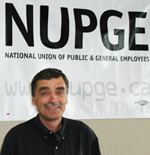It is usually understood that the worst time to have a reasonable debate about criminal justice is right after a particularly heinous crime has been committed. Calm and rational consideration is more difficult when emotions are running high.
The same general rule applies to discussions about labour legislation. Right after a major and unpopular strike, it is difficult to have a reasoned discussion about what kind of labour law is best, because emotions can get in the way, especially when public emotions are fanned by a continuous stream of anti-union anger from the likes of the open-mouth radio hosts and others of similar ilk, where volume and spite substitute for thought.
In Ontario recently there have been two very visible strikes, one at the Ottawa transit system and one at York University. Both were long, both affected the public directly, both were like manna from heaven to the anti-union crowd who are always ready to jump on an issue and pummel it out of all recognition. So now we are seeing the predictable and all too familiar calls for legislation to ban strikes when the public interest is affected.
The Ottawa transit strike, which was totally mishandled by the city, has predictably led Ottawa city council to explore ways to make sure a strike doesn’t occur in the future. One idea is for the city to ask the federal government to declare public transit an essential service, supposedly to prevent strikes and usher in a “new era of labour peace.” Other voices are calling for a legislative ban on strikes in all essential services or all public services.
There are many ways to answer this kind of call for an attack on workers rights. Since it was management’s actions that were the proximate cause of the Ottawa strike, one could, perhaps, call for legislation to prevent management from being needlessly provocative, for laws to force management to bargain with a minimum level of competence and skill. Why would all the focus be on the union’s actions?
We could talk about the fact that the right to real collective bargaining is a fundamental human right, part of Canada’s international commitments, part of Canada’s constitution.
We could note that over 95 per cent of collective bargaining ends up with a settlement without a strike; that time lost from strikes has tended downward over the last decade.
But for the moment, let’s focus in on the indisputable fact that legislation that purports to prevent strikes simply doesn’t work. It doesn’t meet the most basic test of effectiveness.
Two separate studies, from two very different sources, have come to exactly the same conclusion on this point.
The first and most compelling study was done by Larry and Judy Haiven, and was published by the Nova Scotia office of the Canadian Centre for Policy Alternatives. In that study the authors looked at Nova Scotia’s proposed legislation to end the right to strike in health care and community services.
The authors reviewed the experience in Alberta, where strikes in health care were banned 24 years ago. Since 1983, even adjusted for population differences, time lost in Alberta acute care, where strikes are illegal, was 15 times higher than in Nova Scotia, where strikes are legal. The report also looks at several other provinces and sectors. Ontario has had tumultuous illegal strikes in health care. Quebec nurses have struck illegally several times, including Canada’s longest nurses’ strike. In British Columbia 42,000 teachers defied no-strike legislation for sixteen days in 2005 and thousands of others walked out in sympathy.
The exact same conclusion was reached by the CD Howe Institute in a recent study, a study that was done as the Toronto city council considered whether to ask that their transit system be declared an essential service following a strike in that city. That study concluded that declaring a public service “essential”, and passing legislation to require that disputes automatically go to arbitration rather than allowing full strikes or lockouts, does not actually eliminate work disruptions or partial strikes. To the contrary, the study shows that the likelihood of work disruptions increases under an essential-services designation. And such disruptions last much longer.
As an interesting aside, the CD Howe study also concludes that arbitrated settlements are more expensive for the employer.
Cleary, legislation aimed at preventing strikes does no such thing. The C.D. Howe study says that since 1977, there have been 671 public sector strikes in workplaces that have been designated essential. And there have been 41 strikes even where there was a ban on them, such as when teachers in British Columbia staged an illegal strike in 2005.
The CD Howe study notes that Quebec has essential services legislation for public transit, and that the provincial government has had to step in at least twice with specific legislation to end transit strikes.
There are forces in our society who simply dislike unions. That is their right. For these folks, any excuse to limit the effectiveness of unions is fine with them, because they only have one objective. And for those folks, facts are not an impediment to their opinions. For the public at large, though, it is important to consider the facts, not let the anger and frustration of the moment sweep away common sense. For the majority of people, the fact that denying workers their fundamental rights doesn’t even meet its supposed objective should be enough to lay that idea to rest.
There always is a way to prevent strikes. That is to bargain a settlement. It’s the only way that ever works.
Larry Brown is the National Secretary-Treasurer of the National Union of Public and General Employees (NUPGE). The National Union of Public and General Employees (NUPGE) is one of Canada’s largest labour organizations with over 340,000 members. Our mission is to improve the lives of working families and to build a stronger Canada by ensuring our common wealth is used for the common good.



